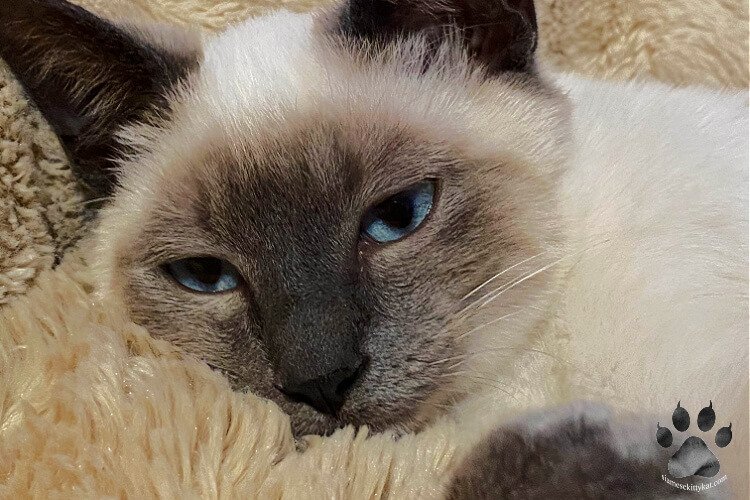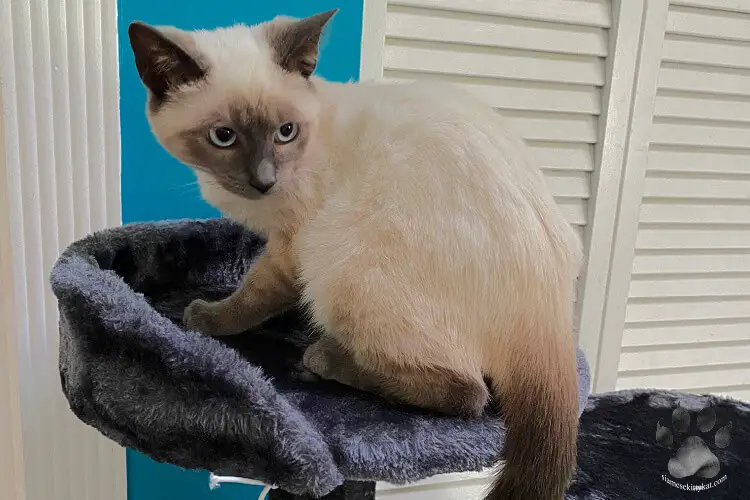Siamese cats, like any other cat, need vaccines to ensure their health and safety.
Vaccinating your Siamese cat should be part of every responsible pet owner’s routine. It offers protection from various infectious diseases.
I took my Siamese cats to the vet for their first round of vaccinations when they were only a few weeks old. We have had to go back yearly for booster shots since then, so they stay up-to-date on their immunizations.
I will discuss the importance of vaccinating your Siamese cat in this article. Keep reading to learn more!
Is Vaccination Necessary for Indoor Cats?
Many people assume that their indoor cats don’t need vaccines because they don’t go outdoors. The truth is, for your cat’s health and well-being, you need to keep up with its vaccinations.
Vaccinating your cat is an effective way to protect them from a variety of infections. Vaccinating your cat is also essential if you ever plan on letting your cat outside at any point in the future.
There are two types of vaccines: core vaccines and non-core vaccines.
Vets recommend core vaccines for all cats. You should consider non-core vaccines based on individual needs and risk factors.
The core vaccines that cats need are:
Non-core vaccines for cats include:
You must understand that vaccinations do not provide immediate protection against disease. Instead, they help build immunity so
your cats become protected against infections with each successive
dose.
Your cat must get all the necessary vaccinations whether you have an indoor or outdoor cat.
There are many illnesses out there that can spread among animals. Thus, in the long run, it pays off to ensure your beloved pet stays as healthy as possible, even if he never goes outdoors.
When Should My Kitten Be Vaccinated?

The general rule of thumb for when to start vaccinating a kitten is 6–8 weeks of age. Kittens should receive vaccines every 3–4 weeks until they reach 4 months old. This helps provide essential protection during their critical first few months of life.
The best way to determine when to stop vaccinating your cat is by consulting a licensed vet. Your vet assesses based on your cat’s breed and other risk factors affecting the timeline for administering shots.
What Happens If I Don’t Vaccinate My Cat?
Although cats are resilient creatures, there are diseases they may be
at risk for, if they do not receive vaccinations.
1. Feline leukemia virus (FeLV) is one of the most serious risks cats face when they don’t have their shots. Cats become exposed to FeLV through direct contact with an infected cat’s saliva, urine, or feces. This can happen when they groom each other or share food/water dishes or litter boxes. The virus can spread through mother-to-kitten transmission in the womb or through nursing.
FeLV attacks a cat’s immune system. This makes them vulnerable to anemia, kidney failure, and cancer. It’s estimated that 90% of cats infected with FeLV die from the disease.
The initial symptoms of FeLV are often difficult to detect. They may not appear until the virus has progressed. Common signs include:
Unfortunately, there is no cure for FeLV presently. Treatment focuses on managing associated symptoms and ensuring proper nutrition for affected felines.
You should limit your cat’s contact with other cats to reduce the risk of spreading the virus further. Vets recommend vaccinating cats against the disease and preventing them from going outdoors.
2. Feline immunodeficiency virus (FIV), also known as cat AIDS, is a viral infection affecting felines worldwide.
FVI is most commonly transmitted through bite wounds from an infected cat. Transmission can also occur if a mother cat becomes infected during her pregnancy.
A cat that becomes infected with FIV will experience three phases of infection. These include the acute phase, the asymptomatic (latent) phase, and the progressive phase.
There is no cure for FVI. However, recent studies suggest that cats
with this condition can live average lives, provided they do not
develop any secondary infections.
3. Bordetella causes severe respiratory problems, such as inflammation of the trachea and bronchi.

The bacteria Bordetella bronchiseptica is responsible for this infection. This often spreads between pets through close contact or airborne particles.
Symptoms of bordetellosis in felines include:
4. Rabies is one of the most urgent and dangerous illnesses a domestic cat can contract.
It is spread through the bite of an infected animal, and it proves deadly in all cases. Not only does rabies pose a serious risk to cats’ health, but it also carries real risks to human health.
Unfortunately, there are no effective treatments or therapies available. This makes the prevention of rabies infection essential. It underscores the importance of vaccinating cats against the virus.
You should consider several factors when contemplating whether to vaccinate your cat:
These factors can help you decide the best vaccinations for your cat.
You can still take other measures to protect your cat from illness even if you opt not to vaccinate your cat.
- Keep your cat indoors whenever possible
- Limit your cat’s contact with unfamiliar animals
- Keep your cat’s environment clean and free of potential contaminants
- Regularly clean your cat’s litter boxes, feeding bowls, and bedding
- Feed your cat a nutritious diet
- Provide clean water to drink
- Regularly brush your cat’s teeth
- Provide regular veterinary care, including parasite control
- Maintain good nutrition
- Avoid stressors like sudden changes in environment
- Routinely deworming kittens
- Keep your cat from toxic plants or chemicals
- Have regular checkups with a veterinarian
Conclusion
Vaccines are a crucial part of ensuring your cat’s health and welfare. There is still a chance your kitty could come into contact with viruses or bacteria even though he is a homebody.
Talk to your vet about the type of shots suitable for your pet. Always keep up-to-date with the vaccination schedule. This gives you peace of mind along with ensuring your cat stays as healthy as possible.
We gathered all the health tips tailored towards maintaining your Siamese cat’s optimal well-being. Check it out here: Siamese Cat Health: A Complete Guide
